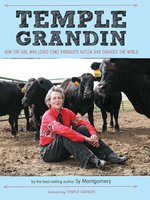-

February 15, 2012
The biography of an exceptional woman who, remarkably, made use of her condition to discover her calling and changed her own and many animals' lives. From earliest childhood, Dr. Temple Grandin, professor of animal science at Colorado State University, stood out with her "odd" ways. Her own father wanted to institutionalize his "retarded" child. Luckily Temple had friends who appreciated her creative mind and a mother who steadfastly believed in her and sought out schools, teachers and therapists who began to help develop her many talents, including a fierce intellect. A kindly high-school teacher led her to realize that her career lay in science. Today Grandin is a world authority and consultant on the respectful, humane treatment of animals raised for food and has designed groundbreaking facilities and equipment that protect livestock from fear and suffering--because her autism permits her to think the way animals do. (Animal lovers particularly may find some descriptions of ranching and slaughterhouse practices hard to take.)Montgomery makes a compelling argument that though one never outgrows autism, it doesn't condemn those who have it to unproductive lives, and an appendix, "Temple's Advice for Kids on the Spectrum," provides first-hand wisdom. Photos and diagrams depict Grandin's work as well as documenting her early life and career. A well written, admiring and thought-provoking portrait. (foreword by Grandin, index, facts about autism and factory farming) (Nonfiction. 10-13)
COPYRIGHT(2012) Kirkus Reviews, ALL RIGHTS RESERVED.
-

March 1, 2012
Temple Grandin is autistic; she thinks in pictures, not words; her senses are overwhelmingly receptive. She's also a genius and a world-renowned expert on animal science. In so many ways Grandin is a unique individual, yet biographer Montgomery illustrates how her struggles and triumphs are universal. Through prolific use of concrete examples from Grandin's childhood and adolescence, Montgomery makes Grandin someone with whom readers can identify. What teenager hasn't felt that they don't fit in? that school is boring? that life is moving too fast? Featuring a foreword by Grandin, photographs from her childhood and adult life, reproductions of her schematic designs for livestock facilities, and inserts on topics ranging from autism to factory farming, Montgomery's book is full of inspiration and information. There are some graphic descriptions of various slaughterhouses Grandin has visited, but they serve to add weight to the importance of her humane work. One of Grandin's greatest gifts is her ability to describe what it is like inside her mind and how her mind and nervous system are similar to those of animals. Because of this, Montgomery's book not only tells the powerful story of one amazing woman's life journey, but also has potential to help readers understand autistic people and animals. An appendix includes Grandin's advice for kids on the autism spectrum, as well as a selected bibliography and list of resources. Photo credits and an index were not available for review. ashley waring
(Copyright 2012 by The Horn Book, Incorporated, Boston. All rights reserved.)
-

July 1, 2012
Featuring a foreword by world-renowned animal-science expert Grandin, photos from her childhood and adult life, reproductions of her schematic designs for livestock facilities, and inserts on topics ranging from autism to factory farming, Montgomery's biography is full of inspiration and information. This powerful story of one amazing woman's life journey will likely help readers better understand animals and autistic people. Bib., ind.
(Copyright 2012 by The Horn Book, Incorporated, Boston. All rights reserved.)
-

March 15, 2012
Grades 4-8 It isn't easy to describe how the mind of someone with autism works, but Montgomery's biography effectively breaks the disorder down for a younger audience while introducing the extraordinary life of activist Temple Grandin. When Grandin was a child, she was withdrawn and unable to communicate. In 1950, at the age of three, she received an unheard-of diagnosis: autism. Grandin's mind thinks visually, in pictures, much the way it is believed that animals think. As such, she is empathetic to their needs and has advocated for the humane treatment of livestock by redesigning cattle facilities to be cruelty-free. In the early chapters, Montgomery's narrative jumps back and forth in time with disjointed results, but it smoothes out as the book progresses. Grandin's story presents autism as a gift, and her I like the way I think attitude will be inspiring to many. With informational sidebars, photos, and blueprints for humane animal-processing facilitiesas well as extensive back matter, including Temple's Advice for Kids on the Spectrum and resourcesthis title will be useful for educators and kids in discussing the prevalent, often misunderstood disorder.(Reprinted with permission of Booklist, copyright 2012, American Library Association.)
-

Starred review from April 1, 2012
Gr 6-8-Montgomery paints a picture of a woman who overcame enormous odds to be highly successful in her chosen career as an animal scientist, designing humane livestock facilities. Although autism can be a devastating diagnosis, Grandin's own words help readers understand why she says her autism adds a dimension to her life that she would not want to be without. The descriptions of the many people who knew her when she was a child and the ways they either helped or hindered her progress give a clear understanding of some of the obstacles in her path. Montgomery includes a thorough explanation of the disorder, helping readers to comprehend this atypical neuropathy. The lively, well-worded narrative is complemented by ample use of photographs and Grandin's complicated drawings of her inventions. For librarians who struggle to find well-written biographies of women, this is a must-buy.-Wendy Smith-D'Arezzo, Loyola College, Baltimore, MD
Copyright 2012 School Library Journal, LLC Used with permission.








